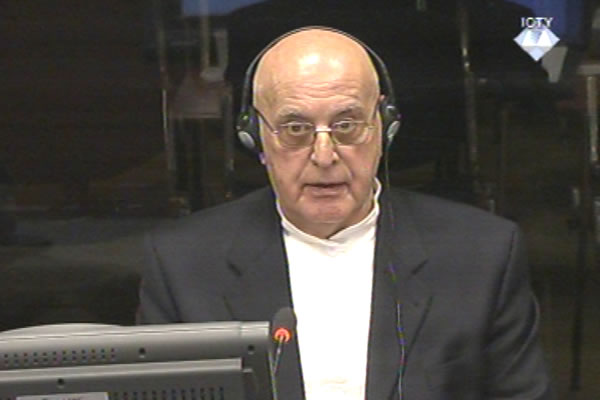Home
TRIAL CHAMBER COMPELLED BEARA TO REPLY TO KARADZIC’S QUESTION
Ljubisa Beara, former security chief in the VRS Main Staff, sentenced to life for the Srebrenica genocide, appeared at Karadzic’s trial to testify under a binding order. At one point, he invoked his right not to reply to questions that may incriminate him. However, the judges also used their right to prevail upon the witness to answer the controversial questions, in closed session
 Ljubisa Beara, witness at the Radovan Karadzic trial
Ljubisa Beara, witness at the Radovan Karadzic trial The hearing at the trial of Radovan Karadzic began with the evidence of Ljubisa Beara, former chief of security in the Republika Srpska Army Main Staff. The Trial Chamber had found Beara guilty of genocide in Srebrenica and sentenced him to life in prison. Beara had initially turned down Karadzic’s request to testify in his defense. This prompted the former Republika Srpska president to apply to the Trial Chamber for a subpoena to be issued to the former VRS Main Staff officer. The Trial Chamber granted Karadzic’s motion. Although he was visibly unwilling to testify, Beara complied with the judges’ order and made a solemn declaration to speak the truth and nothing but the truth.
Before his testimony, the presiding judge advised Beara about Rule 90e of the Rules of Procedure and Evidence, which provides that the witness has the right to refuse to answer any questions that, in his view, could incriminate him. In that case the Trial Chamber can compel the witness to answer, but the answers cannot be used against the witness in any current or future proceedings against him.
Very soon Beara did invoke Rule 90e when Karadzic asked him if Beara ever ‘informed [Karadzic], in writing or orally, that the prisoners from Srebrenica will or already have been executed’. Beara explained that he had consulted his defense lawyer John Ostojic about this issue as he was preparing for his evidence. Ostojic confirmed this to the judges. Karadzic’s legal advisor Peter Robinson urged the Trial Chamber to ‘prevail upon the witness to reply to the question’. The judges deliberated during the break, and on their return, ruled that Beara had to answer the question, but not in open session, as the defense had wanted. The court went into closed session to hear the answer.
As the hearing continued, Beara’s reply could be inferred from Karadzic’s question if they, Karadzic and Beara, had met and spoken during the war. Beara said he had seen Karadzic but didn’t talk to him, which means that he couldn’t have ‘orally informed’ Karadzic about the executions. Karadzic proceeded to ask Beara if during the war he had written or read ‘a VRS document stating that the prisoners from Srebrenica will be executed, that they are being executed or already have been executed’. Invoking Rule 90e once again, Beara said that the ‘same thing applies’ to this question as it had for the previous one. The hearing continued in closed session. When the trial was once again open to the public, Karadzic said he had no further questions for the accused. His legal advisor Peter Robinson asked to ‘re-classify’ Beara’s answers from the closed session as public since there ‘is nothing in them that may incriminate him’. The decision will be made at the end of Beara’s testimony, after the prosecutor’s cross-examination.
The Trial Chamber has allowed the prosecution to cross-examine Ljubisa Beara on 22 January 2014. After Beara completed his examination-in-chief, Karadzic called Milomir Stakic. The war-time president of the Prijedor municipality and of the crisis staff was sentenced to 40 years for the crimes in Prijedor and in the prison camps Omarska, Keraterm and Trnopolje around Prijedor.
Linked Reports
- Case : Karadzic
- 2013-12-13 PROS AND CONS OF ‘STAND-BY COUNSEL’
- 2013-12-12 TWO TRIBUNAL’S CONVICTS TESTIFY IN KARADZIC’S DEFENSE
- 2013-12-11 MLADIC SUBPOENAED TO TESTIFY IN KARADZIC’S DEFENSE
- 2013-12-18 PRISONERS IN COWSHEDS
- 2013-12-19 PROFITEERING BEFORE MURDER
- 2014-01-09 KARADZIC’S PROOF OF ‘HOLBROOKE AGREEMENT’
